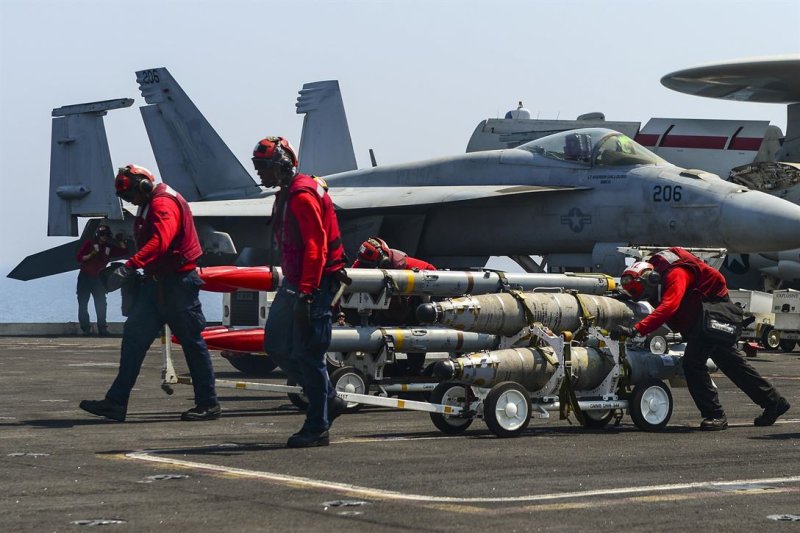Sailors move ordnance aboard the aircraft carrier USS Nimitz in the Arabian Gulf on July 25. An Iranian drone approached the carrier without lights on Aug. 13. Photo by Petty Officer 3rd Class Ian Kinkead/U.S. Navy
Aug. 22 (UPI) -- Iran has threatened to resume its nuclear program and its Islamic Revolutionary Guards Corps has continued to provoke the U.S. Navy in the Persian Gulf, putting into question an international accord formulated under the Obama administration.
U.S. President Donald Trump has accused the Iranians of violating the spirit of the Joint Comprehensive Plan of Action, the agreement between Tehran and world powers regarding Iran's nuclear program.
Following pointed Twitter exchanges between Trump and North Korean leader Kim Jong Un, who threatened the well-being of the U.S. territory of Guam and possibly Hawaii after Trump warned of "fire and fury," there is potential for a new nuclear-oriented conflict.
This time the fight is with Iran. This crisis has the potential of developing into a far more serious dispute than the one with North Korea. The reason is quite simple.
Apart from the heavily policed demilitarized zone separating the two Koreas, there is no possibility of U.S. forces coming into contact with the North Koreans. In the Gulf, however, the Iranians seem intent on provoking the Americans into an international conflict.
As in all aspects of foreign policy, there are two schools of thought on Iran and its nuclear capabilities. Actually, better make that three diverse schools of thought.
First, there are the optimists who believe they can talk the Iranians out of any given situation if they are given enough time. Then there are the pessimists who believe that the only way Iran will give up its weapons is if the West flexes some muscle.
The third group - the realists - understands why the West fears a nuclear-armed Iran and why the Iranians are so intent on obtaining nuclear weapons.
To understand the reasons that propel Iran to pursue its nuclear dreams, examine two major events that will shape Iran's foreign policy for years to come.
The first is the eight-year war between Iran and its neighbor Iraq, during which about 1 million people were killed. Iran came close to capitulation at one point during the war and suffered severe punishment from Saddam Hussein's Iraq in the form of chemical weapons deployed on the front lines.
It was at that point that the ayatollahs vowed never to allow the country to fall into such a vulnerable position again. The key to that problem, the Iranian leadership decided, was to be found in nuclear weapons.
The second event was the U.S. invasion of Iraq. Tehran concluded that it may well be vulnerable to an American invasion and determined that the only sure deterrence was in acquiring nuclear weapons.
The U.S. Navy has accused the Iranians of flying drones dangerously close to one of its aircraft carriers in the Gulf, while the IRGC defended its right to carry out air patrol missions in the area.
The U.S. Naval Forces Central Command said that an Iranian drone had come within 300 meters of a U.S. Navy aircraft carrier while it was in international waters in the Gulf conducting flight operations. A spokesman for the U.S. 5th Fleet said the Iranian drone "conducted an unsafe and unprofessional approach" as it passed by the USS Nimitz without navigation lights late Aug. 13.
The IRGC said in a statement published on Tasnim News Agency that "it carries out air patrol missions in Iran's air defense identification zone every day and in accordance with current regulations."
"The Revolutionary Guards drones are equipped with standard navigation systems and are controlled professionally," it added.
The IRGC accused the United States, which claims Iran has instigated about a dozen such incidents, of not having "capable identification and reconnaissance systems."
With Trump's John Wayne-like outlook on some foreign policy issues, continued provocations by the Iranians may prove to be a costly way to conduct business.
This article originally appeared at The Arab Weekly.















